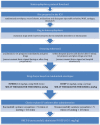Intranasal Midazolam versus Rectal Diazepam for the Management of Canine Status Epilepticus: A Multicenter Randomized Parallel-Group Clinical Trial
- PMID: 28543780
- PMCID: PMC5508334
- DOI: 10.1111/jvim.14734
Intranasal Midazolam versus Rectal Diazepam for the Management of Canine Status Epilepticus: A Multicenter Randomized Parallel-Group Clinical Trial
Abstract
Background: Intranasal administration of benzodiazepines has shown superiority over rectal administration for terminating emergency epileptic seizures in human trials. No such clinical trials have been performed in dogs.
Objective: To evaluate the clinical efficacy of intranasal midazolam (IN-MDZ), via a mucosal atomization device, as a first-line management option for canine status epilepticus and compare it to rectal administration of diazepam (R-DZP) for controlling status epilepticus before intravenous access is available.
Animals: Client-owned dogs with idiopathic or structural epilepsy manifesting status epilepticus within a hospital environment were used. Dogs were randomly allocated to treatment with IN-MDZ (n = 20) or R-DZP (n = 15).
Methods: Randomized parallel-group clinical trial. Seizure cessation time and adverse effects were recorded. For each dog, treatment was considered successful if the seizure ceased within 5 minutes and did not recur within 10 minutes after administration. The 95% confidence interval was used to detect the true population of dogs that were successfully treated. The Fisher's 2-tailed exact test was used to compare the 2 groups, and the results were considered statistically significant if P < .05.
Results: IN-MDZ and R-DZP terminated status epilepticus in 70% (14/20) and 20% (3/15) of cases, respectively (P = .0059). All dogs showed sedation and ataxia.
Conclusions and clinical importance: IN-MDZ is a quick, safe and effective first-line medication for controlling status epilepticus in dogs and appears superior to R-DZP. IN-MDZ might be a valuable treatment option when intravenous access is not available and for treatment of status epilepticus in dogs at home.
Keywords: Benzodiazepine; Dog; Emergency; Epileptic seizures.
Copyright © 2017 The Authors. Journal of Veterinary Internal Medicine published by Wiley Periodicals, Inc. on behalf of the American College of Veterinary Internal Medicine.
Figures
Similar articles
-
Comparison of intranasal versus intravenous midazolam for management of status epilepticus in dogs: A multi-center randomized parallel group clinical study.J Vet Intern Med. 2019 Nov;33(6):2709-2717. doi: 10.1111/jvim.15627. Epub 2019 Oct 3. J Vet Intern Med. 2019. PMID: 31580527 Free PMC article.
-
Intramuscular midazolam versus intravenous diazepam for treatment of seizures in the pediatric emergency department: a randomized clinical trial.Med Intensiva. 2015 Apr;39(3):160-6. doi: 10.1016/j.medin.2014.04.003. Epub 2014 Jun 10. Med Intensiva. 2015. PMID: 24928286
-
Efficacy and safety of intramuscular midazolam versus rectal diazepam in controlling status epilepticus in children.Eur J Paediatr Neurol. 2015 Mar;19(2):149-54. doi: 10.1016/j.ejpn.2014.11.007. Epub 2014 Nov 29. Eur J Paediatr Neurol. 2015. PMID: 25500574 Clinical Trial.
-
Overview of clinical efficacy and risk data of benzodiazepines for prolonged seizures.Epileptic Disord. 2014 Oct;16 Spec No 1:S44-9. doi: 10.1684/epd.2014.0687. Epileptic Disord. 2014. PMID: 25323111 Review.
-
First-line management of canine status epilepticus at home and in hospital-opportunities and limitations of the various administration routes of benzodiazepines.BMC Vet Res. 2021 Mar 4;17(1):103. doi: 10.1186/s12917-021-02805-0. BMC Vet Res. 2021. PMID: 33663513 Free PMC article. Review.
Cited by
-
Maximum volume of nasal administration using a mucosal atomization device without aspiration in Japanese White rabbits.J Vet Med Sci. 2022 Jun 10;84(6):792-798. doi: 10.1292/jvms.21-0648. Epub 2022 Apr 11. J Vet Med Sci. 2022. PMID: 35400673 Free PMC article.
-
Dogs as a Natural Animal Model of Epilepsy.Front Vet Sci. 2022 Jun 22;9:928009. doi: 10.3389/fvets.2022.928009. eCollection 2022. Front Vet Sci. 2022. PMID: 35812852 Free PMC article. Review.
-
ACVIM Consensus Statement on the management of status epilepticus and cluster seizures in dogs and cats.J Vet Intern Med. 2024 Jan-Feb;38(1):19-40. doi: 10.1111/jvim.16928. Epub 2023 Nov 3. J Vet Intern Med. 2024. PMID: 37921621 Free PMC article.
-
Continuous rate infusion of midazolam as emergent treatment for seizures in dogs.J Vet Intern Med. 2021 Jan;35(1):388-396. doi: 10.1111/jvim.15993. Epub 2020 Dec 16. J Vet Intern Med. 2021. PMID: 33325618 Free PMC article.
-
Comparison of intranasal versus intravenous midazolam for management of status epilepticus in dogs: A multi-center randomized parallel group clinical study.J Vet Intern Med. 2019 Nov;33(6):2709-2717. doi: 10.1111/jvim.15627. Epub 2019 Oct 3. J Vet Intern Med. 2019. PMID: 31580527 Free PMC article.
References
-
- Platt SR, Haag M. Canine status epilepticus: A retrospective study of 50 cases. J Small Anim Pract 2002;43:151–153. - PubMed
-
- Saito M, Munana KR, Sharp NJ, et al. Risk factors for development of status epilepticus in dogs with idiopathic epilepsy and effects of status epilepticus on outcome and survival time: 32 cases (1990–1996). J Am Vet Med Assoc 2001;219:618–623. - PubMed
-
- Platt SR, McDonnell JJ. Status epilepticus: Clinical features and pathophysiology. Compend Contin Educ Vet 2000;22:660–669.
-
- Hamamoto Y, Hasegawa D, Mizoguchi S, et al. Retrospective epidemiological study of canine epilepsy in Japan using the International Veterinary Epilepsy Task Force classification 2015 (2003–2013): Etiological distribution, risk factors, survival time, and lifespan. BMC Vet Res 2016;12:248. - PMC - PubMed
-
- Bateman SW, Parent JM. Clinical findings, treatment, and outcome of dogs with status epilepticus or cluster seizures: 156 cases (1990–1995). J Am Vet Med Assoc 1999;215:1463–1468. - PubMed
Publication types
MeSH terms
Substances
LinkOut - more resources
Full Text Sources
Other Literature Sources



